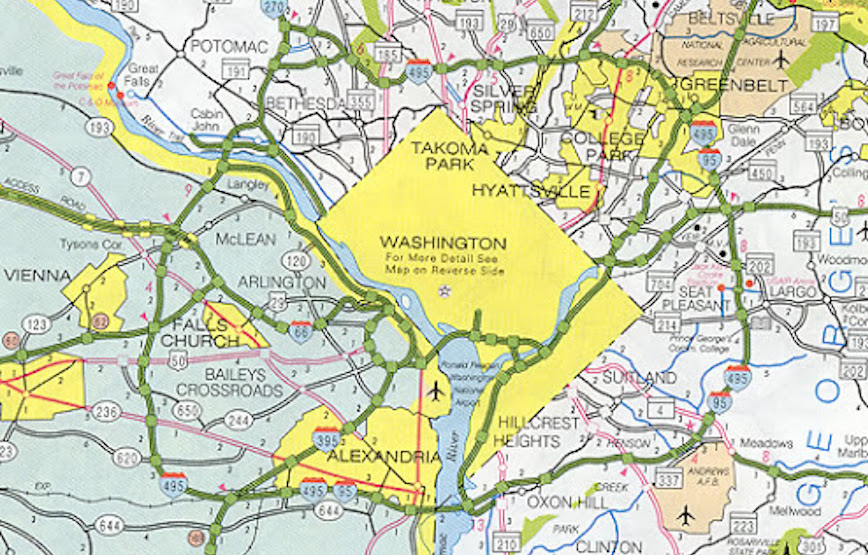Maryland’s ambitious $11-billion public-private partnership to add managed toll lanes to two Washington, DC-area freeways remains stymied by a bid protest, adding the specter of delays and higher costs to the already controversial project.
In mid-February, the state Dept. of Transportation selected a team led by Transurban (USA) Operations Inc., and Macquarie Infrastructure Developments LLC, known as Accelerate Maryland Partners, to lead initial development of the 50-year progressive P3 that will add express lanes to sections of the I-495/Capital Beltway that rings the Nation's Capital, and feeder I-270, including an expanded Potomac River crossing to Virginia.
A protest of the selection from one of two other shortlisted losing teams—one led by Halmar International LLC/Itinera S.p.A., and the other by Ferrovial Agroman US Corp.—has so far prevented MDOT from finalizing a contract with the Transurban team, and also is preventing environmental studies and other pre-development work from getting underway.
MDOT said in a statement that the protest “is still working its way through the process” before the Transurban selection can be presented to the Maryland Transportation Authority for approval.
“Our focus is on the process and carefully looking at the merits of the protest,” the agency added.
Neither the protester nor the nature of the dispute has been made public, although industry speculation has focused on the Ferrovial team, with Itinera CEO Chris Larsen denying protest of the decision in a March statement to The Washington Post.
During a February earnings call, Ferrovial CEO and Executive Director Ignacio Madridejos said that because of the significant gap in the financial score of the bidders that the state communicated to the public, "we are in the process of analyzing the results and information provided in connection to the bid process.” He declined to comment further, citing a confidentiality agreement.
MDOT noted that the factors leading to choosing the Transurban team included its demonstration of a “long-term commitment” to the project “by proposing a higher rate of return on its equity investment in exchange for taking greater construction cost risk upfront, reducing the state's risk in the project."
Another potential point of contention is the withdrawal of Archer Western from the Transurban team for undisclosed reasons after the bidder was shortlisted last August.
According to the I-495/I-270 bid documents, the protest process differs from that used for conventional infrastructure procurements in Maryland, in which a contracting officer’s decision on protest merits is normally made to the state Board of Contract Appeals.
For P3s, the protester can appeal directly to the state Secretary of Transportation and request a hearing with oral statements, presentations of evidence and witness testimony.
The Secretary’s decision is considered “the final agency action,” enabling the protester to take the matter to a state court.
The state P3 contract process also differs from federal procurement, which makes public a bid protest filing and filing party, although not the protest rationale.
Ed Tolchin, a government contracts specialist with the Bethesda, Md., law firm Offit Kurman, says the fact that MDOT has not revealed the nature of the protest suggests that it "remains in the pre-decision phase.”
While he declined to speculate about the reason for the protest or how long a ruling might take, Tolchin says that by eliminating the intermediate step of an appeals board hearing, “the process [for P3s] will get the protest into court more quickly if there’s disagreement with the outcome.”
That could be bad news for MDOT.
Following approval by the MDTA board, the agreement is subject to a mandatory public/legislative review period of at least 30 days before it can receive final approval by the state’s three-member Board of Public Works—a process the agency had hoped would already be complete.
The board, which includes Gov. Larry Hogan (R), a strong backer of the I-495/I-270 project, meets monthly, and may be unable to put the development deal on its agenda for some time. That would dim MDOT hopes that predevelopment work would be complete by summer, allowing negotiations with the Transurban team for final design and construction to begin.
According to bid documents, MDOT can proceed with the P3 Agreement in the face of a protest if the Transportation Secretary determines that "proceeding without delay is necessary to protect substantial State interests.”
A court challenge, however, could present a new obstacle to the project’s progress.
“At this point, there’s a lot of uncertainty,” Tolchin says.






Post a comment to this article
Report Abusive Comment